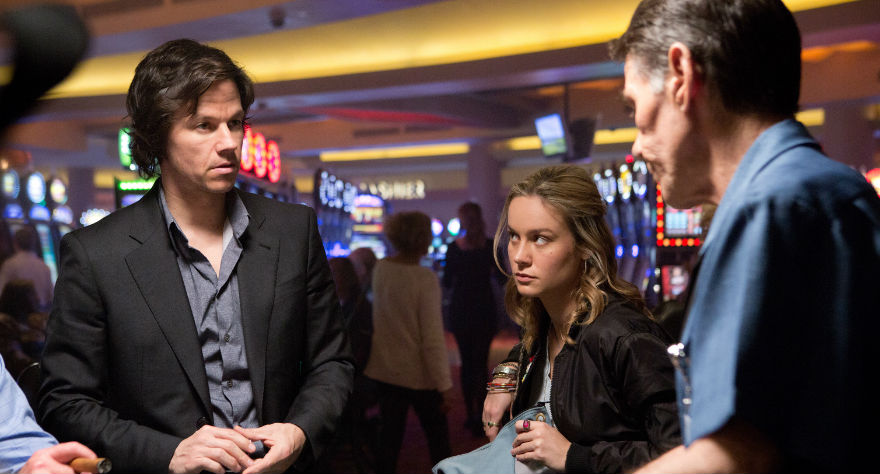
A bitter character portrait that's more shallow than its moody imagery and eloquent dialogue suggest.

A bitter character portrait that's more shallow than its moody imagery and eloquent dialogue suggest.
“Don’t look at him. Look at me. Just deal the cards.” Mark Wahlberg plays a man sprinting down the path of self-destruction in The Gambler, a bitter character portrait set in the seedy world of L.A. underground betting. Rupert Wyatt (Rise of the Planet of the Apes) does a good job directing a gifted cast of talents young and old, and moody cinematography by Greig Fraser gives the film a stylish visual signature, but it’s in the script by William Monahan where the film comes up short. Wahlberg is fully capable of carrying a film on his shoulders and does as best he can here, but when you’re stuck with a character so cynical and ungrateful, we need something more to compel us and keep a vested interest in his journey of doom and gloom, something the introspectively passive script fails to provide.
A remake of the 1974 Karel Reisz movie of the same name, Wyatt’s film starts with a nail-biting game of blackjack at a Korean-run gambling party, thousands of dollars of our anti-hero Jim Bennett’s (Wahlberg) money on the line. “Just deal the cards,” he unblinkingly tells the dealer, who keeps glancing nervously to the casino enforcers hovering in the background. Bennett’s a picture of composure, a high-roller in complete control. Then again…maybe not. The game doesn’t go his way, and a nearby loanshark named Neville (Michael K. Williams) notices, like us, that Bennett looks unbothered, like he just lost 5 bucks at the slots rather than several stacks in a high-stakes card game. Is this man addicted to gambling, or addicted to losing?
After some wise-ass jabbering, Bennett convinces the not-to-be-fucked-with Neville to loan him $50,000. He also ends up borrowing even money from another dangerous kingpin, Frank (John Goodman, in beast mode), who’s also not to be fucked with. Of course, he fucks with them. We learn that Bennett–in his other life a university English professor and retired novelist (he quit after one book)–has one week to pay back the $240,000 debt he owes the Korean mobsters. A dizzying game of evading hitmen and robbing Peter to pay Paul ensues, with Bennett shrugging off all outside help (his wealthy mother, played by Jessica Lange, loans him the debt money, which he squanders at the tables), content with accepting his downfall all by his lonesome.
Hope for a less dreary future lies in the classroom. Amy (Brie Larson) is Bennett’s star student, and also happened to be working as a waitress the night he lost that game of blackjack. There’s a chance, be it a small one, that Amy could be the safety line that saves Bennett from his downward spiral. Two students who may also play a part in his escape from his doom addiction are Lamar (Anthony Kelley), a star basketball player, and Dexter (Emory Cohen), the number 2 college tennis player in the country. How they figure into the grand plot feels a little contrived and convenient, but Kelley does a fine job as a first-time actor, keeping pace with Wahlberg like a pro.
Wahlberg lost a significant amount of weight to play Bennett and exhibits less of his signature tough guy bravado than usual. He’s a whiner, a weasel, and a fast talker who always has something snarky or pessimistic to say, particularly in front of his students. I was surprised to find Wahlberg to be a pretty believable college professor, rambling and ranting about Shakespeare and the absurdity of being a novelist with dark, explosive eloquence. Larson provides arguably the film’s best performance, adding much-needed soul and level-headedness to the scenes she steals. Goodman and Williams are both given chewy roles that they both own, keeping the film alive when it’s on the verge of falling asleep.
In the film’s late stages, it becomes painfully clear that whatever’s going on inside Bennett’s head isn’t that complex or interesting at all, or at least Wyatt and Monahan aren’t interested in exploring the depths of his pathos. Bennett doesn’t reveal himself to be much more than a sad-sack slacker, a lazy schmuck with a death wish who loves swimming with sharks. Even in the film’s climax, you have about as much sympathy for Bennett as you do a snoozing teenager you’re trying to shake awake so they won’t be late for school. It’s infuriating, and barely worthwhile. Wake the hell up, you lazy bastard! I’ve got better things to do!
Fraser’s visuals help keep things flowing, with jazzy compositions (especially during the intense card games) and clever uses of tilt-shift and time lapse. The dreamlike imagery, editing, and soundtrack (an a capella version of Radiohead’s “Creep” is pretty…uh…creepy) invoke the haze of addiction, but the writing never follows through with the message, leaving us unstirred, with little to take home and think about.